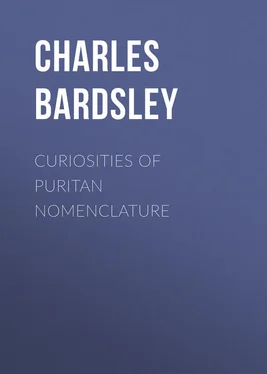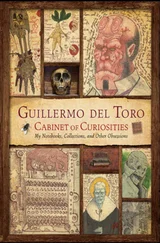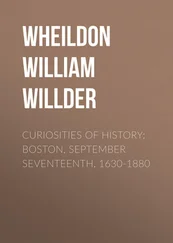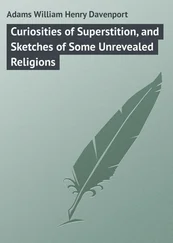Charles Bardsley - Curiosities of Puritan Nomenclature
Здесь есть возможность читать онлайн «Charles Bardsley - Curiosities of Puritan Nomenclature» — ознакомительный отрывок электронной книги совершенно бесплатно, а после прочтения отрывка купить полную версию. В некоторых случаях можно слушать аудио, скачать через торрент в формате fb2 и присутствует краткое содержание. ISBN: , Жанр: foreign_antique, foreign_prose, на английском языке. Описание произведения, (предисловие) а так же отзывы посетителей доступны на портале библиотеки ЛибКат.
- Название:Curiosities of Puritan Nomenclature
- Автор:
- Жанр:
- Год:неизвестен
- ISBN:http://www.gutenberg.org/ebooks/39284
- Рейтинг книги:3 / 5. Голосов: 1
-
Избранное:Добавить в избранное
- Отзывы:
-
Ваша оценка:
- 60
- 1
- 2
- 3
- 4
- 5
Curiosities of Puritan Nomenclature: краткое содержание, описание и аннотация
Предлагаем к чтению аннотацию, описание, краткое содержание или предисловие (зависит от того, что написал сам автор книги «Curiosities of Puritan Nomenclature»). Если вы не нашли необходимую информацию о книге — напишите в комментариях, мы постараемся отыскать её.
Curiosities of Puritan Nomenclature — читать онлайн ознакомительный отрывок
Ниже представлен текст книги, разбитый по страницам. Система сохранения места последней прочитанной страницы, позволяет с удобством читать онлайн бесплатно книгу «Curiosities of Puritan Nomenclature», без необходимости каждый раз заново искать на чём Вы остановились. Поставьте закладку, и сможете в любой момент перейти на страницу, на которой закончили чтение.
Интервал:
Закладка:
“Johannes Palcock, et Beatrix uxor ejus, iiiid.” – W. D. S.
“Ricardus Sylkok, et Matilda uxor ejus, iiiid.” – W. D. S.
The difficulty of identification was manifestly lessened in a village or town where Bate could be distinguished from Batkin , and Batkin from Batcock . Hence, again, the common occurrence of such a component as cock . This diminutive is never seen in the seventeenth century; and yet we have many evidences of its use in the beginning of the sixteenth. The English Bible, with its tendency to require the full name as a matter of reverence, while it supplied new names in the place of the old ones that were accustomed to the desinence, caused this. It may be, too, that the new regulation of Cromwell in 1538, requiring the careful registration of all baptized children, caused parents to lay greater stress on the name as it was entered in the vestry-book.
Any way, the sixteenth century saw the end of names terminating in “cock.”
A dictionary instance is “violin,” that is, a little viol, a fiddle of four strings, instead of six. This diminutive, to judge from the Paris Directory, must have been enormously popular with our neighbours. Our connection with Normandy and France generally brought the fashion to the English Court, and in habits of this kind the English folk quickly copied their superiors. Terminations in kin and cock were confined to the lower orders first and last. Terminations in on or in , and ot or et , were the introduction of fashion, and being under patronage of the highest families in the land, naturally obtained a much wider popularity.
Our formal registers, again, are of little assistance. Beton is coldly and orthodoxly Beatrice or Beatrix in the Hundred Rolls. Only here and there can we gather that Beatrice was never so called in work-a-day life. In “Piers Plowman” it is said —
“ Beton the Brewestere
Bade him good morrow.”
And again, later on:
“And bade Bette cut a bough,
And beat Betoun therewith.”
If Alice is Alice in the registrar’s hands, not so in homely Chaucer:
“This Alison answered: Who is there
That knocketh so? I warrant him a thefe.”
Or take an old Yorkshire will:
“Item: to Symkyn, and Watkyn, and Alison Meek, servandes of John of Bolton, to ilk one of yaim, 26s. 8d.” – “Test. Ebor.” iii. 21. Surtees Society.
Hugh, too, gets his name familiarly entered occasionally:
“ Hugyn held of the said earl an oxgang of land, and paid yearly iiis. vid.” – “The De Lacy Inquisition,” 1311.
Huggins in our directories is the memorial of this. But in the north of England Hutchin was a more popular form. In the “Wappentagium de Strafford” occurs —
“Willelmus Huchon, & Matilda uxor ejus, iiiid.”
Also —
“Elena Houchon-servant, iiiid.”
that is, Ellen the servant of Houchon. Our Hutchinsons are all north of Trent folk. Thus, too, Peter (Pier) became Perrin:
“The wife of Peryn.” – “Manor of Ashton-under-Lyne,” Chetham Society, p. 87.
Marion, from Mary, is the only familiar instance that has descended to us, and no doubt we owe this fact to Maid Marion, the May-lady. Many a Mary Ann, in these days of double baptismal names, perpetuates the impression that Marion or Marian was compounded of Mary and Ann.
Of familiar occurrence were such names as Perrin , from Pierre, Peter; Robin and Dobbin , from Rob and Dob, Robert; Colin , from Col, Nicholas; Diccon , from Dick, Richard; Huggin , from Hugh; Higgin , from Hick or Higg, Isaac; Figgin , from Figg, Fulke; 9 9 In this class we must assuredly place Figgins. In the Hundred Rolls appears “Ralph, son of Fulchon.” Here, of course, is the diminutive of the once common Fulke. Fick and Figg were the nick forms: “1 Henry VIII. To Fygge the taborer, 6d.” – Churchwarden’s Books of Kingston-on-Thames, Brand’s “Pop. Ant.,” i. 147. The London Directory has all the forms and corruptions as surnames, including Fick, Ficken, Figg, Figgs, Figgess, and Figgins.
Phippin , from Phip and Philip; and Gibbin , or Gibbon , or Gilpin , from Gilbert. Every instance proves the debt our surnames have incurred by this practice.
Several cases are obscured by time and bad pronunciation. Our Tippings should more rightly be Tippins, originally Tibbins, from Tibbe (Theobald); our Collinges and Collings, Collins; and our Gibbings, Gibbins. Our Jennings should be Jennins; Jennin Caervil was barber to the Earl of Suffolk in the French wars (“Wars of England in France,” Henry VI.). Robing had early taken the place of Robin:
“Johanne Robyng-doghter, iiiid.” – W. D. S.
Such entries as Raoulin Meriel and Raoul Partrer (this Raoul was private secretary to Henry VI.) remind us of the former popularity of Ralph and of the origin of our surnames Rawlins and Rawlinson:
“Dionisia Rawlyn-wyf, iiiid.” – W. D. S.
Here again, however, the “ in ” has become “ ing ,” for Rawlings is even more common than Rawlins. Deccon and Dickin have got mixed, and both are now Dickens, although Dicconson exists as distinct from Dickinson. Spenser knew the name well:
“Diggon Davie, I bid her ‘good-day;’
Or Diggon her is, or I missay.”
“Matilda Dicon-wyf, webester, iiiid.” – W. D. S.
The London Directory contains Lamming and Laming. Alongside are Lampin, Lamin, and Lammin. These again are more correct, all being surnames formed from Lambin, a pet form of Lambert:
“Willelmus Lambyn, et Alicia uxor ejus, iiiid.” – W. D. S.
Lambyn Clay played before Edward at Westminster at the great festival in 1306 (Chappell’s “Popular Music of ye Olden Time,” i. 29). The French forms are Lambin, Lamblin, and Lamberton, all to be met with in the Paris Directory.
All these names are relics of a custom that is obsolete in England, though not with our neighbours.
These are the terminations that ran first in favour for many generations.
This diminutive ot or et is found in our language in such words as poppet , jacket , lancet , ballot , gibbet , target , gigot , chariot , latchet , pocket , ballet . In the same way a little page became a paget , and hence among our surnames Smallpage, Littlepage, and Paget.
Coming to baptism, we find scarcely a single name of any pretensions to popularity that did not take to itself this desinence. The two favourite girl-names in Yorkshire previous to the Reformation were Matilda and Emma. Two of the commonest surnames there to-day are Emmott and Tillot, with such variations as Emmett and Tillett, Emmotson and Tillotson. The archbishop came from Yorkshire. Tyllot Thompson occurs under date 1414 in the “Fabric Rolls of York Minster” (Surtees Society).
“Rome, April 27, Eugenius IV. (1433). Dispensation from Selow for Richard de Akerode and Emmotte de Greenwood to marry, they being related in the fourth degree.” – “Test. Ebor.,” iii. 317.
“Licence to the Vicar of Bradford to marry Roger Prestwick and Emmote Crossley. Bannes thrice in one day” (1466). – “Test. Ebor.,” iii. 338.
Isabella was also popular in Yorkshire: hence our Ibbots and Ibbotsons, our Ibbetts and Ibbetsons. Registrations such as “Ibbota filia Adam,” or “Robert filius Ibote,” are of frequent occurrence in the county archives. The “Wappentagium de Strafford” has:
Читать дальшеИнтервал:
Закладка:
Похожие книги на «Curiosities of Puritan Nomenclature»
Представляем Вашему вниманию похожие книги на «Curiosities of Puritan Nomenclature» списком для выбора. Мы отобрали схожую по названию и смыслу литературу в надежде предоставить читателям больше вариантов отыскать новые, интересные, ещё непрочитанные произведения.
Обсуждение, отзывы о книге «Curiosities of Puritan Nomenclature» и просто собственные мнения читателей. Оставьте ваши комментарии, напишите, что Вы думаете о произведении, его смысле или главных героях. Укажите что конкретно понравилось, а что нет, и почему Вы так считаете.











